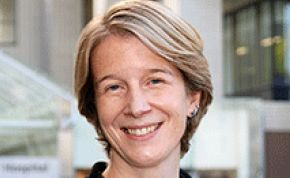Workforce support vital in ‘winter like no other’, says Pritchard
Ms Pritchard (pictured) set out four priorities for the health service when she addressed the NHS Providers annual conference. First it must deal with the current pressures. ‘You can trust the fact that when you have told me, as many of you have, just how challenging it is on the ground, when you have described the rising demand for urgent care in accident and emergency and the community, and when you have talked about the intensity of pressures on workforce, I have heard you and I feel those pressures with you,’ she said.
While numbers of Covid positive inpatients were ‘heading in the right direction’, the greater pressure is in non-Covid urgent and emergency care as people come back into the system having stayed away during the pandemic. And a ‘very stretched social care system’ was creating discharge challenges, that contributed to pressures at the hospital front door, where ambulances were waiting too long to hand over patients.
All this meant that ‘response times are not what any of us would want them to be’ and she added that ‘indications suggest we are not going to get any let up for a while’. ‘We know the next few months are going to be a winter like no other so our collective focus must of course be on patient safety,’ she said.
Priority number two is continuing the vaccine programme, while the third is addressing the elective backlog. She said the NHS had made good progress on recovering non-Covid services. Elective treatment in the first half of the year was at 90% of pre-pandemic levels, while diagnostic testing was over 95%. And there are numerous examples of local systems with successful initiatives. ‘But there are too many people waiting for care and that is just the people who have already come forward,’ she said. ‘We know the challenges, but there are opportunities to do things in a smarter way.’
These included expanding capacity by increasing flexibility for staff, the physical separation of estate, increased collaboration across systems, partnerships with the independent sector and more use of technology.
‘We also know this will be a multi-year challenge,’ she added, and this will be supported by a soon-to-be-published elective recovery plan.
The NHS England and NHS Improvement chief executive said the further priority was to ‘carry on transforming for the future’. ‘This is multi-faceted, but it has got to start with workforce,’ she said. ‘Central to everything we do has to be supporting, growing and empowering our workforce.’
Right now, this meant ‘supporting the staff we have’ and continuing to have a strong health and wellbeing offer in place over a ‘very difficult winter’.
However, support was not enough. ‘It is unfair to ask our staff to keep working so hard,’ she said. ‘We do need the right number and we need the right skill mix of staff to be able to deliver the models and quality of care we want to deliver for our patients.’
She highlighted health and social care secretary Sajid Javid’s commitment to a long-term workforce plan by spring next year. ‘It is crucial we get this right,’ she said.
With the NHS due to move to a structure based around integrated care systems from next April, Ms Pritchard said that the pandemic had underlined that ‘the principles of integrated care, of system working, and of partnership are exactly the right ones’. She said these principles could be seen in the vaccine programme, in the mutual aid between trusts to ensure patients had access to critical care, in the discharge arrangements with social care to get people home as soon as they were medically fit, and in the establishment of cancer and surgical hubs to keep vital care being provided.
Related content
We are excited to bring you a fun packed Eastern Branch Conference in 2025 over three days.
This event is for those that will benefit from an overview of costing in the NHS or those new to costing and will cover why we cost and the processes.